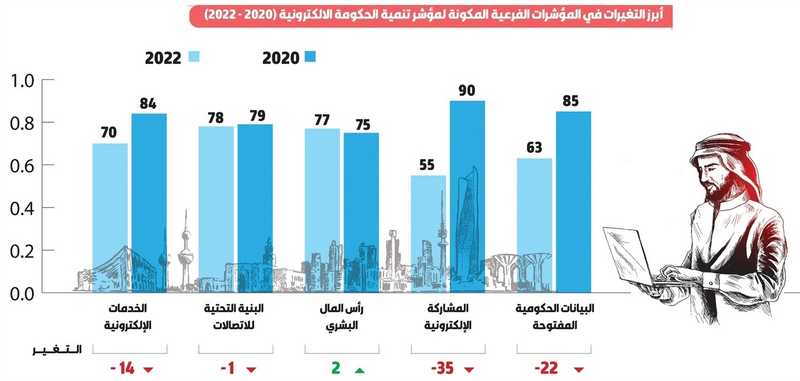The United Nations e-government development index for 2022 shows Kuwait’s global ranking fell 15 places on the e-government development index and is placed in the 61st place.
An official government report, a copy of which is obtained by a local Arabic daily concluded that it is necessary to implement 10 specific recommendations to enhance the development of e-government in Kuwait.
Kuwait’s rank fell by 49 places on the e-participation index for the year 2020, and it lags behind by two places at the level of the Gulf Cooperation Council countries, while the human capital index — concerned with the ability of human resources to disseminate and use information and communication technology — was the only one that witnessed improvement, as it rose from the 75th position in the year 2020 to 77 in 2022, while the rest of the other indicators declined.
The index is concerned with evaluating the digital growth of the governments of United Nations member states using e-government and the status of its development.
It also evaluates the performance of e-government in countries, and measures the readiness and capabilities of national institutions to use information and communication technology to provide public services and to determine their patterns of development and performance.
–Kuwait ranked 61st globally on the e-government development index.
–The e-services index dropped 14 places, to come in at the 70th place.
–The Telecommunication Infrastructure Index fell one place from 79 to 78.
–The e-participation index dropped 35 places.
–The open government data index fell 22 places, bringing Kuwait to 63rd place, compared to 85th place earlier
The report issued by the National Observatory for Sustainable Development and Future Foresight, affiliated to the General Secretariat of the Supreme Council for Planning and Development, stressed on the need to implement the following recommendations for the development of e-government in the State of Kuwait
1. Supporting the employment of information and communication technology in all state agencies to ensure the development of institutional performance, improve services and facilitate access to them at the lowest cost, highest efficiency and the fastest time.
2. Securing the necessary infrastructure to connect all state institutions with a single information network for the exchange of information between the various parties.
3. Providing advisory support in all different areas of digital transformation to serve and achieve the desired strategic goals and improve performance.
4. Develop programs and activities to empower individuals and eradicate information technology illiteracy as a basic pillar for building a contemporary information society in order to create a knowledge environment.
5. Supporting telecommunications companies in the country, regulating and monitoring their services to ensure increased efficiency and productivity to achieve optimal performance of the telecommunications sector, ensure transparency, equality and achieve free competition.
6. Ensuring information security and providing the necessary technical automatic oversight for the construction of an integrated electronic technical building.
7. Benefiting from the successful experiences of developed countries in applying the e-government survey.
8. Training and qualifying human capabilities to build capacities and develop skills to ensure the provision of the best services at the highest level.
9. Encourage investment in telecom infrastructure by various stakeholders in the public and private sectors.
10. Creating collaborative electronic platforms to achieve high efficiency and speed in exchanging information and services and improving response to citizens needs

